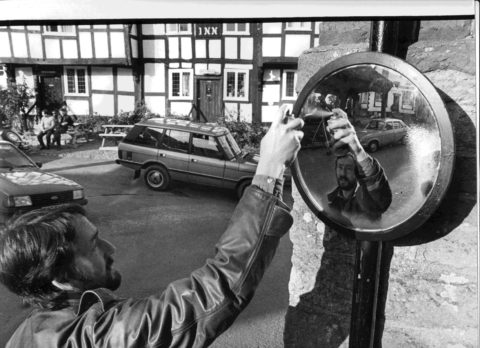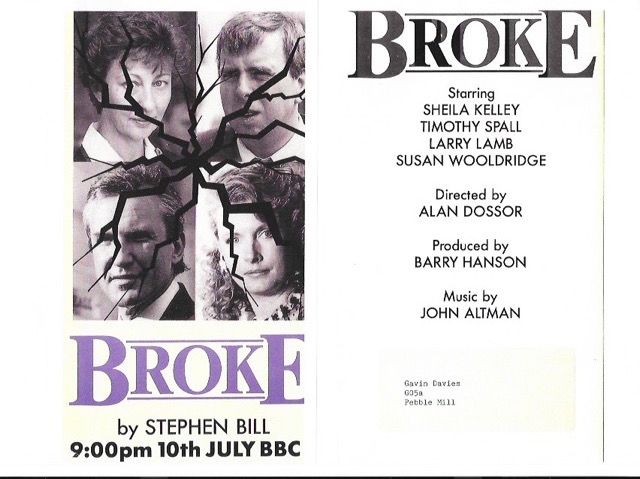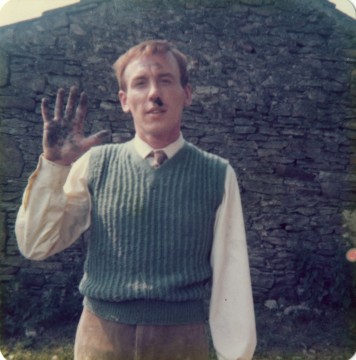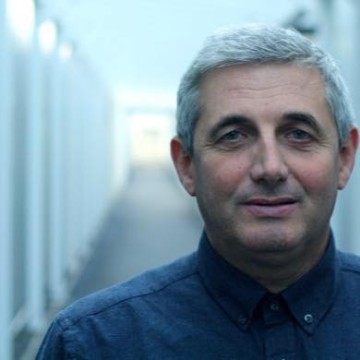
Peter Sasdy & Barry Hanson on Witchcraft. Photo by Willoughby Gullachsen, no reproduction without permission

Gavin Davies, Barry Hanson, Alan Dosser, Tom Beech, probably on Broke. Photo by Willoughby Gulachsen, no reproduction without permission
Barry Hanson sadly died in June 2016. Here is his obituary in The Guardian, written by Christopher Hampton and Stephen Frears:
https://www.theguardian.com/tv-and-radio/2016/aug/14/barry-hanson-obituary
Barry Hanson, who has died aged 72, moved through several branches of his profession before finding his true vocation as a television producer. At Pebble Mill, the BBC’s broadcasting centre in Birmingham, under David Rose, he produced a series of plays known as Second City Firsts (1973-74). Next, for ITV, came a film that was to come fourth in the BFI’s list, made in 2000, of the 100 best TV shows of the century: The Naked Civil Servant (1975), based by Philip Mackie on Quentin Crisp’s memoir about his battles for sexual freedom, directed by Jack Gold and starring John Hurt. This won a Bafta award for Hurt, and the Prix Italia. Almost immediately it established itself as one of the most memorable and groundbreaking programmes of its era.
After several more hard-hitting plays and series for TV came Barry’s most celebrated project. The Long Good Friday (1980) was written by Barrie Keeffe for Thames Television, where Barry had arrived to work with Verity Lambert. When the company’s nerve failed in the face of the script’s uncompromising power, Barry had it bought back from them and decided to launch it as a film for the cinema.
Financed by Lew Grade’s ITC Entertainment, it was directed by John Mackenzie. However, its central premise, that the carving-up of London’s Docklands between Bob Hoskins’s London mobster and the New York mafia is disrupted by the IRA’s attempt to muscle in on the action, so alarmed decision-makers that it was decided to remove this crucial element and bury the film in some ITV graveyard shift.
Barry’s response was, with Mackenzie, to hijack the negative and head for Los Angeles. There, after much intricate manoeuvring, a sale was eventually arranged to George Harrison’s Handmade Films: and so emerged what, as last year’s re-release reminded us, is almost certainly the finest British gangster film since Brighton Rock.
I first knew him as a member of the small – but tolerated – heterosexual minority when I arrived to work at the Royal Court theatre, London, in 1968. He had stepped sideways from the publicity department to become an assistant director to Peter Gill in his DH Lawrence productions and to Robert Kidd on my play Total Eclipse. He then progressed to directing Sunday-night productions without decor (as they were known) and a collective satirical piece in the Theatre Upstairs called The Enoch Show, about the wave of racism stirred up by the speeches of the Conservative MP Enoch Powell.
His Yorkshire roots always remained of great importance to him and he shared with many of his friends from the area – the playwrights Mercer and David Halliwell and the actor Victor Henry – a keen nose for metropolitan bullshit and a healthy mistrust of authority. These qualities stood him in particularly good stead when it came to the troubled realisation of The Long Good Friday.
The following year, 1969, he left for Hull to run the first arts centre in Britain, where he worked closely with Alan Plater and presented Richard III with Hoskins, among many other plays.
From the Royal Court, Barry brought with him an instinctive sense of commitment to the directors he worked with – including Stephen Frears, Michael Apted and Ken Russell – and, even more strongly, to the writers: John Osborne, David Mercer, Howard Brenton, David Rudkin, Trevor Preston and Stephen Poliakoff. In disputes with management, he invariably took the side of the artist, but the colder winds that began to blow in the 1980s, as television was prised from the fingers of the creators and handed over to ever thicker layers of administrators, created a climate that no longer suited his buccaneering temperament.
There was other work – The Wine Programme on Channel 4 (1982), the first-ever series on the subject, Russell’s Lady Chatterley series and A Year in Provence (both 1993) – which engaged him and kept him moving. But the glory days were over and the increasingly debilitating effects of his rheumatoid arthritis made matters considerably worse. He continued in TV till 1995, and returned to film production for a one-off, Creep (2004), a horror story set under the streets of London, with the disused Aldwych tube station among its locations.
Barry was born in Bradford, West Yorkshire, to Harry Hanson, a compost salesman, and his wife, Irene (nee Raistrick), a burler and mender, removing and remedying imperfections in cloth at the local wool mill. Educated at Bellevue grammar school in the city, he began, along with his fellow pupil the future actor Edward Peel, to take an interest in theatre there, and went on to read English at Newcastle University. A year’s teaching at Bradford grammar school made it clear to him that his fate lay elsewhere, and he took a job in publicity at Harrogate theatre, from which he moved on to the Royal Court.
Advertisement
His Yorkshire roots always remained of great importance to him and he shared with many of his friends from the area – the playwrights Mercer and David Halliwell and the actor Victor Henry – a keen nose for metropolitan bullshit and a healthy mistrust of authority. These qualities stood him in particularly good stead when it came to the troubled realisation of The Long Good Friday.
In 1969 Barry met Susanna Capon – I believe I introduced them. They married in 1971 and their daughter, Katy, was born in 1978. For many years, they kept a convivial house in Hammersmith, west London, entertaining a wide range of friends.
An amicable divorce in 2012 did not prevent Susanna and Katy from supporting Barry through his long final illness, in Pembrokeshire, where they had moved to be close to Katy’s solicitor practice and their grandson and granddaughter.
Christopher Hampton
Stephen Frears writes: Barry Hanson was a terrific fellow – he came from the Royal Court where the writing was new, lively and serious and continued to put writing in the foreground when he went on to work in television. I made four films with him, all provocative and full of vitality, all about the new Britain that had emerged after the war, all serious but drenched in popular culture.
We made them very quickly with the best of young British actors (Richard Beckinsale was in two of them) and the best of young British technicians. Barry was always on the side of good work: he could make your head spin with excitement.
• Barry Anthony Hanson, film and TV producer, born 10 August 1943; died 20 June 2016
The following message was posted on the Pebble Mill Facebook page:
Lynne Cullimore: ‘Sad to hear this. I did not know him but used to work on the publicity for Second City Firsts, so of course came across him. Its always sad when you hear of a fellow “Pebble Miller” not being around anymore.’
Save
Save
Save
Save
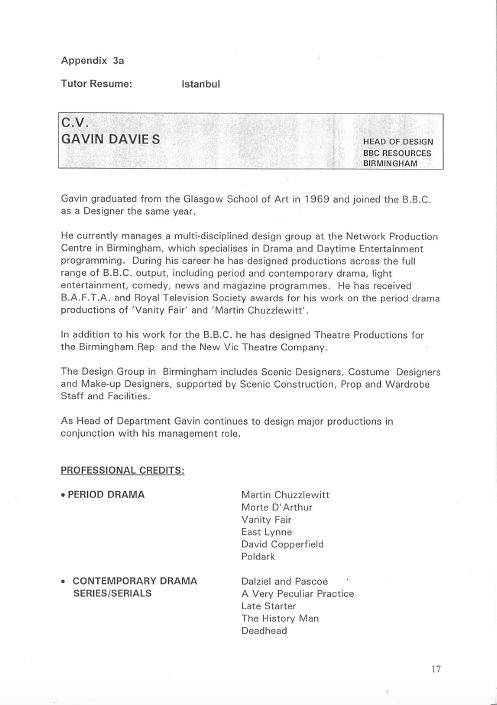
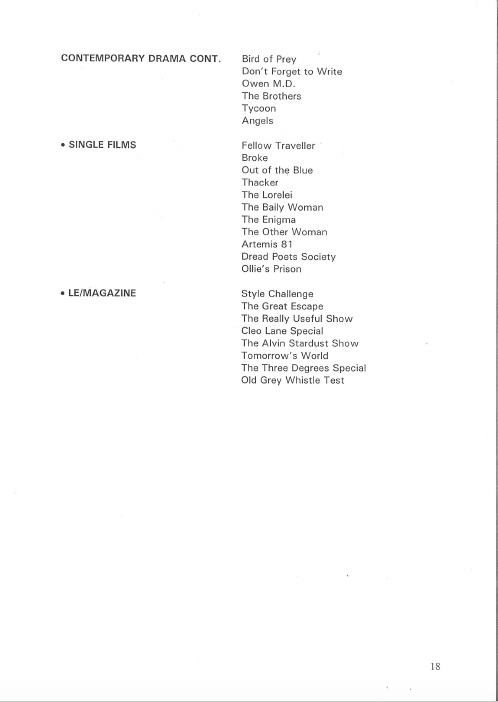 Here is production designer, Gavin Davies’s CV, and impressive credits list. I think the CV dates from the mid 1990s when the services of crafts people were hired to Independent companies, following John Birt’s re-organisation of the BBC.
Here is production designer, Gavin Davies’s CV, and impressive credits list. I think the CV dates from the mid 1990s when the services of crafts people were hired to Independent companies, following John Birt’s re-organisation of the BBC.